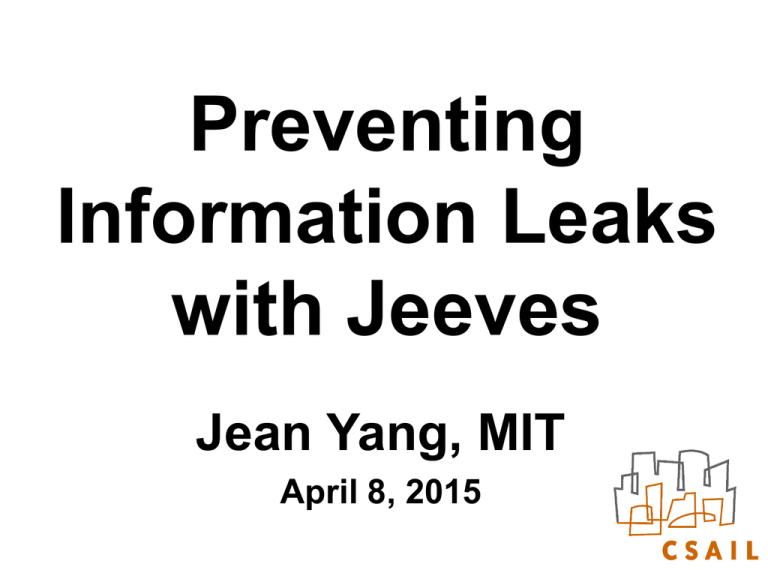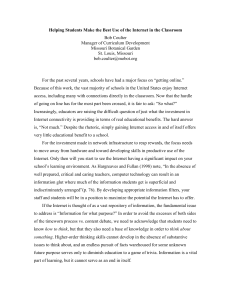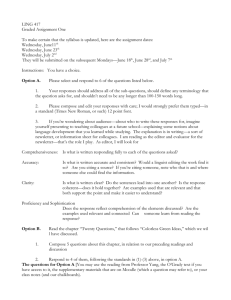pptx
advertisement

Preventing
Information Leaks
with Jeeves
Jean Yang, MIT
April 8, 2015
Data, Data Everywhere
Electronic health
records
Social
media
Online courses
Jean Yang / Jeeves
Wearable
devices
2
All Kinds of People Are
Writing All Kinds of
Code
Open source
lines of code
Medical
researchers
Social
scientists
Journalists
Children
Jean Yang / Jeeves
3
Even Trained
Developers Leak
Information
Jean Yang / Jeeves
4
Why Aren’t Existing
Approaches Enough?
Encrypting
Data
Defensive
protection
Exploit
Patch
But people are still
showing the data
wrong.
But leaves system
builders a step
behind.
Jean Yang / Jeeves
5
My Approach:
Privacy by Construction
Factor out privacy to reduce
opportunity for leaks.
• Programmer specifies high-level policies about
how sensitive data can be used.
• Rest of program is policy-agnostic.
• System manages policies automatically.
Jean Yang / Jeeves
6
Social Calendar Example
Alice and Bob throw a surprise party for Carol.
Jean Yang / Jeeves
7
Problem:
Even Seemingly Simple
Policies Have Subtleties
Surprise
party for
Carol at
Chuck E.
Cheese.
Guests
Private event
at Chuck E.
Cheese.
Pizza with
Alice/Bob.
Strangers
Carol
Policy: Must be guest.
Policy: Only visible to
hosts until finalized.
Policies can depend on
sensitive values and other
policies.
Jean Yang / Jeeves
8
Enforcing Policies Can
Leak Information!
Surprise
party at
Chuck E.
Cheese.
Policy: Must be guest.
Guests
2
1
Policy: Only visible to
hosts until finalized.
Guests can’t see
event
• Subtle mistake:
check for policy 1
neglects
dependency on
policy 2.
• Problem arises
when programmers
trusted to get
dependencies right.
Guests can see
event
Guest list finalized
Jean Yang / Jeeves
9
Problem:
Policies Are Intertwined
Across the Code
“What is the most
popular location
among friends 7pm
Tuesday?”
Update to
event
subscribers
• Track information flow through derived values.
• Track where derived values flow.
Jean Yang / Jeeves
10
“Policy Spaghetti”
in Real Systems
Code from
HotCRP
conference
management
system
Highlighted: conditional permissions checks everywhere.
Jean Yang / Jeeves
11
Automatic Enforcement
with Jeeves
The well-intentioned programmer
writes same code no matter what
policies are.
Programming
model.
Mathematical
guarantees.
Jean Yang / Jeeves
Implementations,
web framework,
and case studies.
12
Jeeves Factors Out
Policies
• Centralized policies.
• Policy-agnostic
program.
• Runtime
differentiates
behavior.
Model
View
Jean Yang / Jeeves
Controller
13
This Talk
Background.
Jeeves programming model.
[POPL ’12]
How Jeeves works.
[PLAS ’13]
Theoretical guarantees.
[PLAS ’13]
Implementation & evaluation.
Jean Yang / Jeeves
[draft]
14
Automatically Managing
Information Flow
Jeeves supports more
expressive policies
than prior work.
1. Specifying policies.
2. Specifying differentiated behavior.
3. Factoring out policies from other
code.
4. Enforcing policies that depend on
sensitive values.
Only Jeeves supports 3 and 4.
Jean Yang / Jeeves
15
Related Work:
Checking Information
Flow
Must explicitly
define and tag
alternate behavior.
Programmer
tags data.
if viewer ==
:
elif viewer !=
==
System prevents
leaks by raising
error.
==
true
error
false
:
Information flow controls check that only allowed flows occur [HiStar,
Flume, Resin, LIO/Hails, Jif/Sif, flow locks, F*, and more].
Jean Yang / Jeeves
16
My previous work.
Related Work:
Computing with Multiple
Values
Must encode
policies as tags.
==
• “Policy
spaghetti.”
• Policies can
leak
information.
true
false
Multi-execution approaches differentiate behavior based on viewer
[secure multi-execution (Devriese et al); faceted execution (Austin and
Flanagan)].
Jean Yang / Jeeves
17
This Talk
Background.
Jeeves programming model
model.
How Jeeves works.
Challenges
1
Theoretical guarantees.
Factoring out
information flow.
Supporting
expressive policies
that can depend on
sensitive values.
2
Implementation & evaluation.
Jean Yang / Jeeves
18
Policy-Agnostic
Programming in Jeeves
policies
Policies describe rules for
how values may flow to
output contexts.
Sensitive values
encapsulate multiple
behaviors.
Application Code
Separate from policies.
Jean Yang / Jeeves
19
Jeeves Supports
Expressive Policies
A policy is an arbitrary function that takes the
output context and returns a Boolean value.
def isNotCarol(oc): return oc !=
Output context can be of arbitrary type.
Policies can depend on sensitive values.
def isGuest(oc): return oc in
.guests
.guests
Jean Yang / Jeeves
[]
20
Jeeves Programming
Model
Programmer
specifies policies
and facets.
1
==
Runtime
produces
differentiated
output based on
the viewer.
4
print {
Programmer
writes policyagnostic
programs.
2
Runtime
propagates values
and policies.
3
true
false
}
print {
true
}
false
Jean Yang / Jeeves
21
The Jeeves
Programming Model
• Well-defined runtime semantics
for policy-agnostic programming
with information flow policies.
• Can be implemented standalone
or embedded as a library.
• Has been adapted across
runtimes in web frameworks.
Jean Yang / Jeeves
22
This Talk
Background.
Jeeves programming model
How Jeeves works.
Theoretical guarantees.
Challenges
Handling policies
with dependencies.
1
Implementation & evaluation.
Enforcing
policies when
state changes.
2
Jean Yang / Jeeves
23
Jeeves Execution Model
Runtime simulates simultaneous multiple
executions.
x = 0
Runtime
propagates
values and
policies.
if
print {
}
print {
1
0
1
Runtime
: solves for
values to show
based on
policies and
viewer.
2
==
x += 1
return x
Jean Yang / Jeeves
}
24
Using Policies to
Produce Outputs
Jeeves uses
policies to defacet
appropriately.
policy(
def isNotCarol(oc):
return oc !=
0
1
print {
}
)
(
!=
) ? 1 : 0
0
Jean Yang / Jeeves
25
But What About
Dependencies?
def isMaybeCarol(oc):
return oc ==
print {
policy(
)
(
==
) ?
:
}
Need to find a
fixed point!
Possible solutions:
(
==
) ?
:
(
==
) ?
:
Jean Yang / Jeeves
Jeeves runtime
will pick the secret
value if allowed.
26
Using Constraints to
Handle Dependencies
Evaluated with
respect to state
at time of
output.
policy(
a
1
Label
def isGuest(oc):
return oc in .guests
a
0
Policy
𝑎 ∈ {𝑠𝑒𝑐𝑟𝑒𝑡, 𝑝𝑢𝑏𝑙𝑖𝑐}
print {
)
𝑎 = 𝑠𝑒𝑐𝑟𝑒𝑡 ⇒
in
⊢ 𝑎 = 𝑠𝑒𝑐𝑟𝑒𝑡 ⇒ 𝑓𝑎𝑙𝑠𝑒
⊢ ¬(𝑎 = 𝑠𝑒𝑐𝑟𝑒𝑡)
0
Jean Yang / Jeeves
}
.guests
• Constraints contain
only Boolean
variables.
• Always a consistent
assignment.
27
Handling Indirect Flows
a
if
==
:
x += 1
if
a
true
false
:
x += 1
Labels follow
values through all
computations,
including
conditionals and
assignments.
a
x =
xold+1
xold
Jean Yang / Jeeves
28
Jeeves Runtime Semantics:
Outputting to Sinks
Statement
evaluation
Σ, 𝑆 ⇓ 𝑉𝑝 , 𝑜𝑐: 𝑅
Expression
evaluation
Σ, 𝐸 ⇓𝑝𝑐 Σ ′ , 𝑉
Evaluate output context
Σ, 𝐸𝑜𝑐 ⇓∅ Σ𝑜𝑐 , 𝑉𝑜𝑐
and expression to print.
Σ𝑜𝑐 , 𝐸𝑟 ⇓∅ Σ𝑟 , 𝑉𝑟
𝑘1 … 𝑘𝑛 = 𝑐𝑙𝑜𝑠𝑒𝐾(𝑙𝑎𝑏𝑒𝑙𝑠 𝐸𝑜𝑐 ∪ 𝑙𝑎𝑏𝑒𝑙𝑠(𝐸𝑟 ), Σ2 )
Retrieve labels
𝐸𝑝 = 𝜆𝑥. 𝑡𝑟𝑢𝑒 ∧𝑓 … ∧𝑓 Σ2 (𝑘𝑛 )
and policies.
policies applied
Σ𝑟 , (𝐸𝑝 𝑉𝑜𝑐 ) ⇓∅ Σ𝑝 , 𝑉𝑝 Evaluate
to the output context.
pick 𝑝𝑐 such that 𝑝𝑐 𝑉𝑜𝑐 = 𝑜𝑐, 𝑝𝑐 𝑉𝑟 = 𝑅, 𝑝𝑐 𝑉𝑝 = 𝑡𝑟𝑢𝑒
Σ, print 𝐸𝑜𝑐 𝐸𝑟 ⇓ 𝑉𝑝 , 𝑜𝑐: 𝑅
Policies Output Result
context
Jean Yang / Jeeves
Defacet using
satisfying policy
assignment.
29
This Talk
Background.
Jeeves programming model
Challenges
Defining what it
means to enforce
policies.
1
How Jeeves works.
Theoretical guarantees.
Implementation & evaluation.
Jean Yang / Jeeves
Proving
enforcement with
respect to our
semantics.
2
30
Non-Interference
Secret values should not affect public output.
a
if
==
if
:
x += 1
a
==
:
x += 1
a
1
0
print {
0
Jean Yang / Jeeves
Jeeves Challenge:
Compute labels
from program—may
have dependencies
}
on secret values!
31
Jeeves Non-Interference
and Policy Compliance
a
if
==
if
:
x += 1
a
==
:
x += 1
a
1
0
print {
0
Jean Yang / Jeeves
Jeeves Theorem:
All executions where
a must be public
produce equivalent
}
outputs.
Can’t tell apart secret values
that require a to be public.
32
Jeeves Policy
Compliance Theorem
Suppose we have
𝑎
𝑎
𝑆1 = 𝑝𝑟𝑖𝑛𝑡 𝑒 𝐶[ 𝐸1 𝐸𝑃 ]
𝑆2 = 𝑝𝑟𝑖𝑛𝑡 𝑒 𝐶[ 𝐸2 𝐸𝑃 ]
Where 𝑎 must be public.
Then the set of values 𝑆1 evaluates to is equivalent
to the set of values 𝑆2 evaluates to.
𝑓: 𝑅 ∃𝑉. ∅, 𝑆1 ⇓ 𝑉, 𝑓: 𝑅} = {𝑓: 𝑅 | ∃𝑉. ∅, 𝑆2 ⇓ 𝑉, 𝑓: 𝑅}
Need to account for policies that depend on sensitive values!
Jean Yang / Jeeves
33
This Talk
Background.
Jeeves programming model Challenges
How Jeeves works.
Adapting the
approach for web
applications.
Theoretical guarantees.
2
1
Scaling the
approach.
evaluation.
Implementation &
and
evaluation.
Jean Yang / Jeeves
34
Facets in the Application
and Database
Application
Queries
select * from Users
where location =
Application
All data
select * from Users
SQL
Database
Database
queries can
leak
information!
SQL
Database
Impractical
and
potentially
slow!
Solution: Facet the database. Implemented as an objectrelational mapping supporting uniform facet representation.
Jean Yang / Jeeves
35
Jacqueline Web
Framework
Jeeves runtime
Application
Frontend
Attach policies.
Viewer
Database
@jeeves
Programmer is responsible
Framework is responsible
Jean Yang / Jeeves
36
Django-like
data schema
for describing
fields.
Helper
functions for
policy include
queries.
Policy for
‘location’ field.
Public value for
‘location’ field.
Jean Yang / Jeeves
37
Implemented in Jeeves
Conference
management system
Course manager
Medical records
(HIPAA)
Questions
1. How does faceted execution scale?
2. How does faceting the database affect
queries?
Jean Yang / Jeeves
38
Demo
Jean Yang / Jeeves
39
CMS Running Times
Show All Papers
0.25
0.2
0.15
0.1
0.05
0
0
200
400
Number of papers in DB
512 users
Time to load page(s)
Time to load page (s)
Show Single Paper
50
40
30
20
10
0
200
400
Number of papers in DB
512 users
1024 users
Database size does not affect
query speed.
0
1024 users
Showing sensitive data grows
linearly.
Tests from Amazon AWS machine via HTTP requests from another machine.
Jean Yang / Jeeves
40
Evaluation Lessons
• Faceted execution is expensive.
• Policy-agnostic programming
does not always need faceted
execution.
• Many opportunities for
optimization in web frameworks.
Jean Yang / Jeeves
41
Policy-Agnostic
Programming in Jeeves
Sensitive
values
Policies
==
Other functionality
Design of a policyagnostic
programming
language
[POPL ‘12]
Semantics and
guarantees
[PLAS ’13]
Jean Yang / Jeeves
Implementation,
web framework,
and case studies
[in submission]
42
My Interests in
Provable Guarantees
Typechecked
Verified
F*: type-checking
Verve: a provably
security properties.
type-safe OS.
[PLDI ’10 (Best Paper); [ICFP ’11; JFP ‘13]
CACM ‘10]
Ask Reeves: verified
privacy policies.
[patent filed]
Lessons
• Difficult to write secure and private programs.
• Even more difficult to prove them correct.
• Easier if we can get privacy by construction.
Jean Yang / Jeeves
43
The Future of PolicyAgnostic Programming
• Factor out policies from other code.
• Rely on compiler and runtime to
differentiate behavior.
Jean Yang / Jeeves
44
Making Policy-Agnostic
Programming Work
• Programmability.
– Languages for different kinds of policies.
– Tools for verifying and visualizing policies.
• Scaling.
– Policy-agnostic semantics with minimal faceting.
– Building foundations with policy management in mind.
Web
frameworks
Databases
Web browsers
Jean Yang / Jeeves
45
Parting Thoughts
By reducing opportunity for
programmer error, we can
eliminate whole classes of
privacy leaks.
Jean Yang / Jeeves
46






